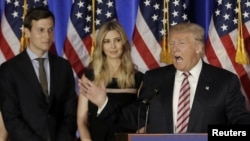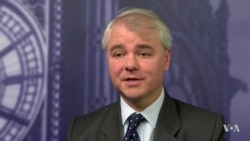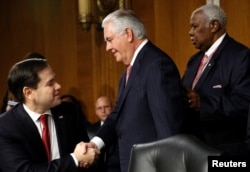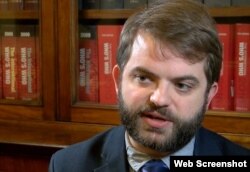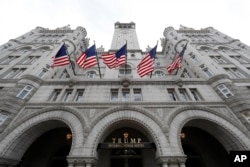The anti-corruption group Transparency International says it is concerned that allegations of conflicts of interest and nepotism in the Trump administration may hurt international perceptions about America's ability to continue serving as a champion of anti-corruption efforts around the world.
After its annual report on corruption perceptions, the Berlin-based group minces no words in laying out what it sees as troubling signs in the new U.S. administration.
“The concerns about the U.S. are the concentration of power, the ideas around conflicts of interest being unmanaged, cronyism, nepotism and the muzzling of the press so these are the conditions that we would look out for in the future as to where a country might decline in the rankings,” said Robert Barrington, Transparency International’s director for Britain.
Watchdog Says US Transparency Rating May Be Endangered
President Donald Trump was elected partly on promises to “drain the swamp,” take power away from Washington cronies and return it to the American people.
Choices draw scrutiny
But Trump’s decision to name his son-in-law as a senior White House adviser, and conflict-of-interest allegations against him and his appointees have drawn the scrutiny of the U.S. media.
Transparency International says that could hurt the United States’ image as an anti-corruption leader.
“It has played a very important role and a very successful role, but it can only do that if it has the moral authority to tell others to live by its own standards and if its own standards decline, that will be a problem,” Barrington told VOA.
“There are no actual signs of corruption,” he said. “It’s very early in the day, so we’re looking at warning signs for the future.”
Key Cabinet nominees who have drawn scrutiny include Rex Tillerson, Trump’s pick for secretary of state who was formerly head of the oil giant ExxonMobil.
“Rex Tillerson I think has done a good job of divesting himself immediately of his Exxon stock, sort of reducing conflict of interest. The Office of Government Ethics, which advises the president and presidential appointees on these issues, gave him a clean bill of health relatively quickly,” said Jacob Parakilas, a U.S. policy analyst at Chatham House.
“Other candidates still have some questions over their heads,” Parakilas said.
Nominees raise questions
Tom Price, Trump’s nominee for Health and Human Services secretary, faced tough questions of whether he, as head of the House Budget Committee, used his position to benefit his stock trades.
But some observers say overwhelming evidence exonerates Price of unethical behavior.
Most, if not all, of Trump’s appointees are expected to clear the confirmation process.
Cabinet nominees have historically undergone intense scrutiny. In 1993, Zoe Baird and Kimba Wood, two of then-President Bill Clinton’s choices for attorney general, failed the confirmation process following media revelations they had employed undocumented migrants as nannies.
Trump’s nominee for White House budget director, Mick Mulvaney, has faced questions for failing to pay taxes on a household employee more than 12 years ago.
Mulvaney explained to a Senate Budget Committee he had not done so because he did not consider the worker, a babysitter, a household employee. He has since paid at least part of the tax bill and admitted error.
"We made a mistake,” he said.
Some observers say immigration violations are often seen in America as more politically sensitive and severe than tax-compliance issues.
While the U.S. media has relentlessly questioned the nominees’ records, Parakilas said the current political landscape in Washington has also made for a smoother ride for Trump’s picks.
Republican Party
“The fundamental thing that’s protecting them is the fact that the Republican Party controls the Senate, which has to consent to Cabinet-level appointees,” Parakilas said. “Whereas in previous administrations, you had a broader range of opinions within Senate majorities, now the parties are fairly polarized and there is a strong expectation that you will vote for the president’s nominees unless there’s a massive reason why you would not."
While expressing concern about the damage that revelations of corruption -- should they be substantiated -- could do, Transparency International’s Barrington notes the American system of checks and balances remains a strong guarantee.
“It’s a democracy. Freedom flourishes. There’s a thriving civil society. There’s a strong opposition. So, these are very positive signs as well,” he said.
The 2016 election suggests voters wanted power in the hands of Washington outsiders.
Analysts say that in this honeymoon phase, many Americans are more likely to be focused on Trump’s promises of economic prosperity, security and putting America first, and less inclined to be concerned about issues of nepotism, tax compliance and conflict of interest.
World leaders have even less reason to be interested at this stage.
“It’s not the primary focus of attention or concern about the Trump administration,” Parakilas said, adding global leaders are more concerned about the uncertainty that Trump’s remarks and actions on trade and security alliances have created.
“I would say the level of attention from global audiences on the questions of nepotism and transparency are lower ranking than those,” Parakilas said.
That is especially true, he said, among the 158 nations that scored lower than the United States did in Transparency International’s Corruption Perceptions Index.




